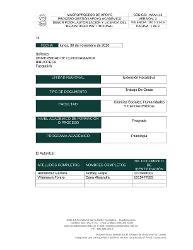| dc.description.abstract | Esta investigación/intervención comprende la emergencia narrativa del duelo en
historias de supervivientes del conflicto armado colombiano frente a la configuración
del vínculo persona-animal en participantes de la mesa de víctimas del municipio
de Facatativá. Se orientó bajo posturas complejas,
constructivistas/construccionistas y sistémicas, en relación a postulados teóricos
como la teoría eco-eto-antropológica de los vínculos junto con la teoría narrativa,
dando paso a comprender el duelo de manera eco-sistémica y compuesto de
factores tanto sociales como individuales, enmarcado dentro de un contexto de
conflicto armado colombiano, orientado en objetivos investigativos e interventivos.
Metodológicamente a partir de los principios que orientan el enfoque de la
investigación/intervención reflexiva y contextual de segundo orden, se diseñaron
cuatro escenarios narrativos conversacionales, que permitió un análisis desde la
complementariedad de la postura vincular en torno a la configuración de cualidades
y operadores temporo-espaciales del vínculo entre persona/animal y los postulados
narrativos hacia la clasificación de narrativas de legitimación, diferencia,
incertidumbre y posibilidad y la comprensión de la pragmática, semántica y
semiótica del lenguaje.
La investigación/intervención contó con la participación de 6 personas víctimas de
desplazamientos forzado, quienes hacen parte de la mesa de víctimas en el
municipio de Facatativá. Como resultados se obtuvo que la intervención operó
como un ritual de transición hacia escenarios de paz y reconciliación. Además de
emerger nuevas narrativas que se transformaron de legitimación del dolor hacia la
incertidumbre y posibilidad, así como acciones significativas en las personas
participantes, mientras que a nivel vincular se obtiene sentido e interrelación no solo
con animales sino con el territorio, ecosistema y contexto.
ABSTRACT
This research/intervention includes the narrative emergence of mourning in stories
of survivors of the Colombian armed conflict in front of the configuration of the
human-animal bond in participants of the table of victims of the municipality of
Facatativá. It was oriented under complex, constructivist/constructionist and
systemic postures, in relation to theoretical postulates such as the eco-eto anthropological theory of the bonds together with narrative theory, giving way to
understanding mourning in an eco-logical waysystemic and composed of both social
and individual factors, framed within a context of Colombian armed conflict, oriented
to investigative and interventional objectives.
Methodologically, based on the principles that guide the second-order reflexive and
contextual research/intervention approach, four conversational narrative scenarios
were designed, which allowed an analysis from the complementarity of the position bonding around the configuration of qualities and temporal-spatial operators of the
bond between person/animal and narrative postulates towards the classification of
legitimation narratives, difference, uncertainty and possibility and understanding of
the pragmatic, semantic and semiotic language.
The investigation/intervention involved the participation of 6 victims of forced
displacement, who are part of the table of victims in the municipality of Facatativá.
As a result, the intervention operated as a ritual of transition to scenarios of peace
and reconciliation. In addition to emerging new narratives that were transformed
from legitimizing pain to uncertainty and possibility, as well as significant actions in
the participants, while at the level of bonding meaning and interrelation is obtained
not only with animals but with the territory, ecosystem and context. | es_CO |


